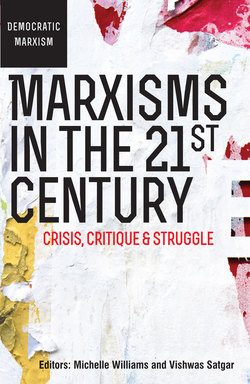Читать книгу Marxisms in the 21st Century - John Saul - Страница 21
На сайте Литреса книга снята с продажи.
Toward a global Marxism
ОглавлениеTo some, sociological Marxism is an oxymoron – after all, classical Marxism dismissed sociology as bourgeois ideology, and if Western Marxism borrowed from sociology, especially from Weber and Sigmund Freud, it was not to elevate the idea of civil society. Gramsci himself was dismissive of sociology as concerned only with the spontaneous and thus the trivial.8
Why now sociological Marxism? Simply put, sociology’s credentials as critic of marketisation and statisation are unquestioned. Whether we turn to the writings of Weber or Durkheim, Georg Simmel or Roberto Michels, Norbert Elias or Parsons, Habermas or Bourdieu, the critique of economic reductionism and instrumental rationality is central. Perhaps the state might have been seen as a potential or partial neutraliser but today that possibility seems to have evaporated. As the state seems to be ever more in thrall to the market, the defence of an independent ‘civil society’ seems to become all the more necessary. The problem, however, with sociology – and we might say the same of Gramsci and Polanyi – is that the notion of ‘civil society’ was contained within national boundaries. Today, we have to give the idea a transnational scope.
Marketisation – the commodification of labour, money and nature – is affecting all parts of the planet. No one escapes the tsunami, although some are able to mount more effective dykes. On the face of it, there needs to be a global solution but here we should proceed carefully as solutions can turn out to be as bad as the problem they seek to fix. What could be worse than a planetary totalitarianism, constituted in the name of preventing destruction of the environment? We might be better off knitting together national solutions that centre on society. However, here again we see problems as the state of societies is very different: in South Africa it is fissiparous; in China it is precarious; in Russia it is gelatinous. In every country we need to reconnoitre the trenches of civil society, map out the relations between society and state, society and market. Only in that way can we better understand the possibilities for global connections. Only in that way can we better understand the possibilities for real utopias.
As we think about a global civil society, we must also think of a global Marxism, that is, a Marxism that transcends but also recognises national and regional configurations. If first-wave Marxism was national in scope, and second-wave Marxism was regional (Soviet, Western and Third World), today we have the possibility of a Marxism that still recognises nation and region but also encompasses pressing experiences shared across the world, albeit unevenly. And if first-wave Marxism projected socialism as a utopia guaranteed by laws of history, and if second-wave Marxism became a ruling ideology, justifying socialism as Stalinism – utopia-become-dystopia – then third-wave Marxism constructs socialism piecemeal as an archipelago of real utopias that stretch across the world, attracting to themselves populations made ever more precarious by third-wave marketisation. The Marxist becomes an archaeologist digging up alternatives spawned and wrecked by the storms of capitalism and state socialism.
Finally, and most ominously, we face the creation of another fictitious commodity, one that Polanyi never anticipated – knowledge. We live in a world where knowledge is ever more important as a factor of production, whose production and dissemination is ever-more commodified. The university, once a taken-for-granted public good has become a private good subject to the dictates of the market. Students become fee-paying consumers in search of vocational credentials that guarantee them little but lifetime debt, faculties are diced and spliced into the casualised labour of teachers and researchers, non-academic staff are outsourced while administrators become highly paid managers and corporate executives. The university that cultivated citizens for a democratic polity and produced knowledge to solve societal problems, is being transformed into an instrument of the short-term demands of capital at the very time its contributions to the survival of the planet are most needed. The struggle for the university becomes a struggle not just for its own survival; it has a central role to play in any countermovement to third-wave marketisation, a possible Modern Prince for the defence of modern society.
